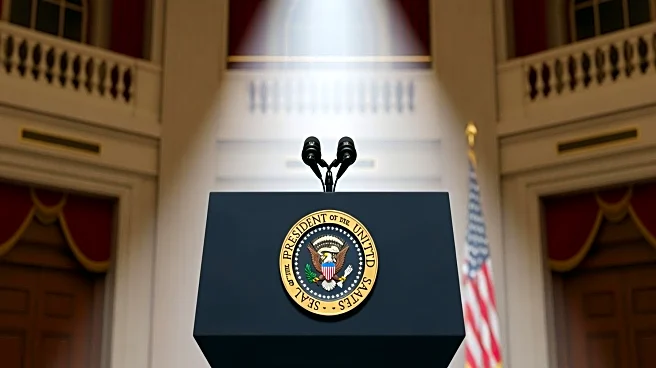What's Happening?
President Trump recently addressed the Knesset after Hamas released the remaining 20 live hostages from Gaza. This development is part of a broader geopolitical strategy that Trump has been implementing,
which many believed was unattainable. The release of hostages marks a significant milestone in the ongoing conflict between Israel and Hamas, and Trump's involvement is seen as a pivotal moment in the peace process. The address to the Knesset underscores the importance of diplomatic efforts in resolving long-standing regional tensions.
Why It's Important?
The release of hostages and President Trump's address to the Knesset are crucial in the context of Middle Eastern diplomacy. This event could potentially lead to a shift in the dynamics of the Israel-Hamas conflict, offering a new pathway for peace negotiations. Trump's approach, which is described as 'thinking big and acting smart,' may influence future U.S. foreign policy in the region. The successful negotiation for the release of hostages could enhance the U.S.'s role as a mediator in international conflicts, impacting diplomatic relations and security strategies in the Middle East.
What's Next?
Following the release of hostages, further diplomatic engagements are expected to continue. The U.S. may pursue additional negotiations to stabilize the region and prevent future escalations. The international community will likely monitor the situation closely, with potential involvement from other nations to support peace efforts. The focus will be on maintaining the ceasefire and exploring long-term solutions to the conflict, possibly involving international stabilization forces or new diplomatic frameworks.
Beyond the Headlines
The implications of President Trump's involvement in the Gaza deal extend beyond immediate diplomatic achievements. This event highlights the complexities of international diplomacy and the role of the U.S. in global peace efforts. It raises questions about the ethical responsibilities of powerful nations in conflict resolution and the long-term impact of such interventions on regional stability. The situation may also influence public opinion on U.S. foreign policy and its effectiveness in achieving peace.









